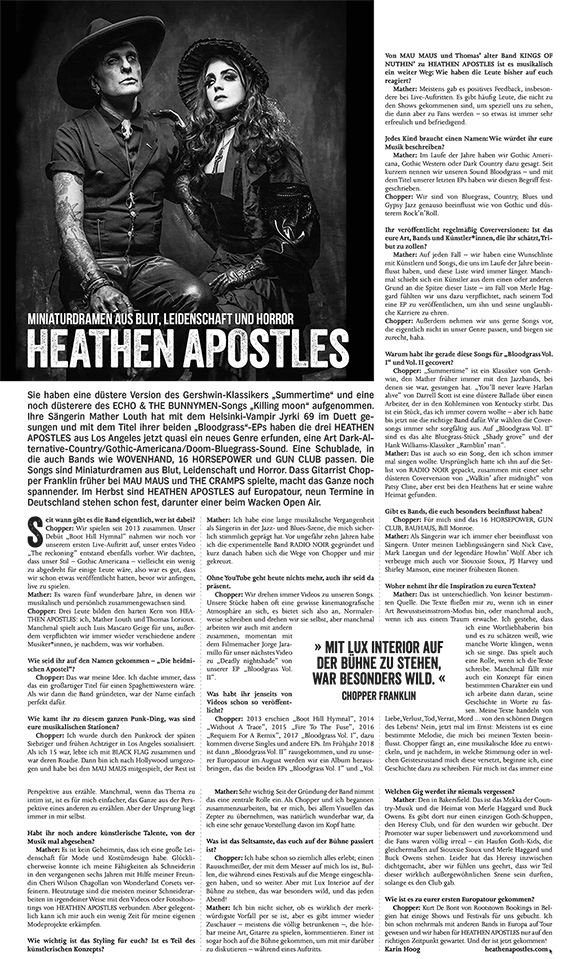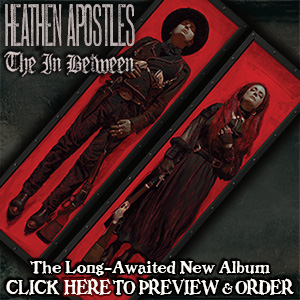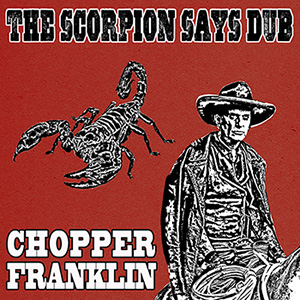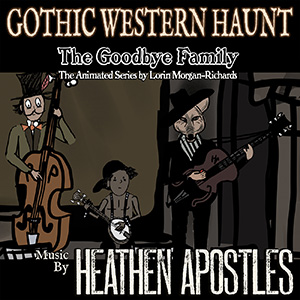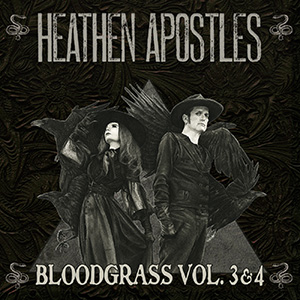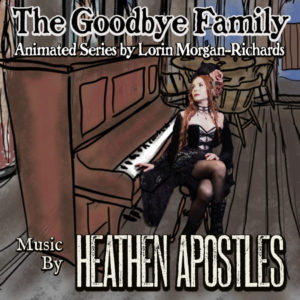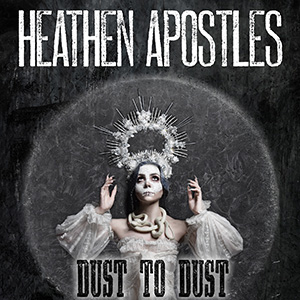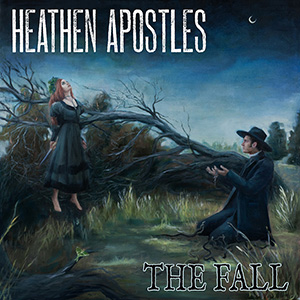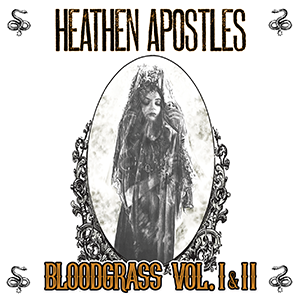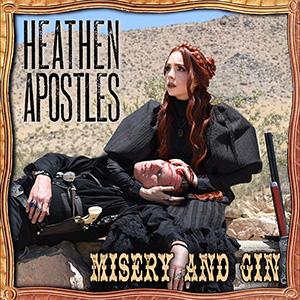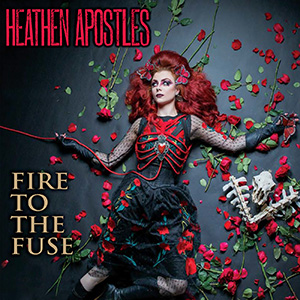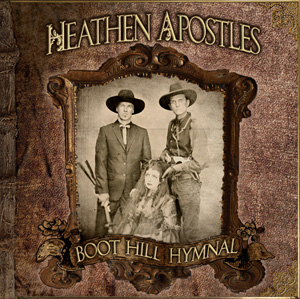Heathen Apostles’ Interview in Germany’s Ox Magazine
During the build up to their 2018 European Tour, the Heathen Apostles were interviewed by Karin Hoog of the popular German music magazine Ox Magazine. Below is a scan of the Heathen Apostles’ interview in German, to read the English translation scroll below it.
They have a gloomy version of the Gershwin classic “Summertime” and a even more gloomy of the ECHO & THE BUNNYMEN song “Killing Moon” recorded. Their singer Mather Louth has duets with the Helsinki vampire Jyrki 69, and with the title of their two “Bloodgrass” EPs, the HEATHEN APOSTLES from Los Angeles has invented a new genre, a kind of Dark AIternative-Country / Americana Gothic / Doom bluegrass sound. A drawer in which also fits bands like WOVENHAND, 16 HORSEPOWER and GUN CLUB. The songs are miniature dramas of blood, passion and horror. That guitarist Chopper Franklin played earlier in MAU MAUS and THE CRAMPS, makes it all more exciting. In autumn, HEATHEN APOSTLES are on a European tour, nine dates in Germany have already decided, including one at the Wacken Open Air.
When did you start playing together as a band?
Chopper Franklin – We formed in 2013 and recorded our “Boot Hill Hymnal” album and shot the “The Reckoning” music video before we played our first show. We thought that our brand of Gothic Americana might be a little crazy for some people to wrap their mind around, so it was good to have those out when we first started gigging.
Mather Louth – It’s been a wonderful 5 years growing together musically and personally.
Where did you get the name Heathen Apostles from?
Chopper – A demented mind. I always thought of as a great title for a spaghetti western. Then when this project came about, the name was perfect for it.
Can you please tell me more about the members and their background?
Chopper: I come from the punk rock days of the late 1970’s and early 1980’s in Los Angeles. I lived with, and roadied for, Black Flag in 1979 when I was 15. I soon moved to Hollywood and joined the Mau Maus, and the rest, as they say, is history.
Mather: I’ve got a long musical history in the jazz and blues scene as a singer, and it’s certainly shaped my phrasing and vocal style to a degree. I formed the experimental Radio Noir about a decade ago, and once that ran its course, Chopper and I crossed paths, and here we are 5 years later!
Nothing works without YouTube today, you are there too.
Chopper: We are always shooting videos for our different songs and releases. A lot of our songs have a bit of a cinematic feel to them, it’s great to release videos to go along with them. We usually write and direct them ourselves, but we do work with others too. We are currently collaborating with filmmaker Jorge Jaramillo on our next video for “Deadly Nightshade” (off of the upcoming Bloodgrass Vol. II EP).
What have been the band’s releases up to now?
Chopper: Boot Hill Hymnal (2013), Without A Trace (2014), Fire to the Fuse (2015), Requiem for a Remix (2016), Bloodgrass Vol. I (2017) as well as several singles and other EPs. We will be releasing “Bloodgrass Vol. II” digitally this Spring, as well as an album combining both Bloodgrass Vol. I and Vol. II EP’s for our European tour in August.
From the Mau Maus and Thomas’ Kings of Nuthin’ to the Heathen Apostles, it’s a long way to go musically: how have people reacted to you?
Mather: It’s mostly been a positive response to our music, particularly when we are performing live. Oftentimes there are people who aren’t at the shows to watch us specifically, but end up becoming fans and introducing themselves- that connection always feels deeply gratifying.
Every child needs a name: how do you describe your music?
Mather: We’ve used several terms over the years: Gothic Americana, Gothic Western, dark country, and so on. More recently, we’ve been classifying what we do as “bloodgrass” (with our latest EP titles cementing that association.)
Chopper: We’re influenced by bluegrass, country, blues and gypsy jazz, as well as gothic and heavy rock n roll.
You regularly release covers: Are you thereby paying tribute to bands/artists you like?
Mather: Absolutely- we always have a “wishlist” of artists and songs that have inspired us over the years, and that list tends to grow over time. Sometimes, an artist moves to the front of our list for one reason or another- in the case of Merle Haggard, we felt compelled to release an EP after his passing in honor of his incredible career.
Chopper: We also love to take songs that weren’t meant for our genre and bending them to our will, haha.
Can you please tell me more about the songs you covered on “Bloodgrass Vol.1” Why did you choose them?
Chopper: “Summertime” is a Gershwin classic that Mather has covered for quite a while with jazz bands she’s performed with, and “You’ll Never Leave Harlan Alive” is a dark ballad about workers dying in the coal mines of Kentucky. It’s a song I’ve always wanted to cover but never had the right band to do it until now. We take a lot of care in choosing and recording the songs we cover. “Bloodgrass Vol. II” has the old bluegrass standard “Shady Grove” on it, as well as Hank Williams’ “Ramblin’ Man”.
Mather: “Ramblin’ Man” is another tune I’ve been singing for what seems like forever. Initially, I had introduced it into the Radio Noir setlist (along with a very dark cover of Patsy Cline’s “Walking After Midnight”), but I feel it has truly found its home with the Heathens.
Are there any bands that influenced you?
Chopper: For me 16 Horsepower, Gun Club, Bauhaus, Bill Monroe.
Mather: I’ve always been influenced as a vocalist by a lot of male performers- some of my favorites being Nick Cave, Mark Lanegan, and the legendary Howlin’ Wolf. However, I’m equally in awe of Siouxsie Sioux, PJ Harvey, and Shirley Manson (my earliest icon.)
Where do you draw the inspiration for your lyrics from?
Mather: It’s never really from one consistent source. Lyrics float to me when I’m in a sort of stream-of-consciousness creative mode, or sometimes when I wake from a dream. I’m an admitted logophile and appreciate how certain words reverberate when sung, so that plays a hand in my lyric writing. Sometimes, a concept for a specific character will come to me, and then I work to tell their tale lyrically.
Do you have other artistic talents apart from music?
Mather: Those that know me know that it’s no secret I’ve got an immense passion for couture and costume design. I’ve been rather fortunate over the past 6-odd years to hone my craft as a seamstress with the help of my dear friend Cheri Wilson Chagollan (of Wonderland Corsets.) Nowadays, most of my sewing projects are directly tied into the Heathen Apostles music videos and photo shoots. But on occasion, I can eke out time for personal couture projects (and have also tackled a select amount of commissioned projects for private clients.)
How important is your styling/your appearance to you? Is it part of your artistic concept?
Mather: Absolutely- it’s always been a central force in our band since its formation. When Chopper and I first began collaborating, he expressed that he’d like me to take the reins for crafting our visual aesthetic (which was wonderful, being that I had a strong stylistic vision in my mind from the get-go!)
What’s the strangest thing that ever happened to you while being on stage?
Chopper: I’ve had it all happen it seems; knife pulled on me by a bouncer, cops beating up the crowd at a street festival, getting electrocuted, etc., but being onstage with Lux Interior of The Cramps was wild every night.
Mather: I don’t know if it’s the strangest occurrence per se, but I have had audience members (usually the drunken sort) audibly comment on my “backwards” style of playing guitar. One actually came up to me and tried talking to me about in…in the middle of a set.
Which gig you’ll never forget?
Mather: I’d say hands-down, Bakersfield was an amazing gig for the band. We had been approached by Heresy (the one and only goth club in Bakersfield, which as a city is far more known for being a country music mecca and home to Merle Haggard and Buck Owens.) The promoter was so lovely and accommodating to us, and the fans were absolutely unreal- just imagine a large pack of goth kids who are equally as passionate about Siouxsie Sioux as they are about Merle and Buck! Sadly, Heresy is now defunct, but we were so honored to be a part of that amazing scene while it was still around.
How did your European tour come about?
Chopper: We were put in touch with Kurt De Bont of Rootstown Bookings in Belgium and he started putting together the shows and festivals. I’ve toured Europe several times with other bands, so we were looking at the right time to bring over the Heathen Apostles, and this was it!

